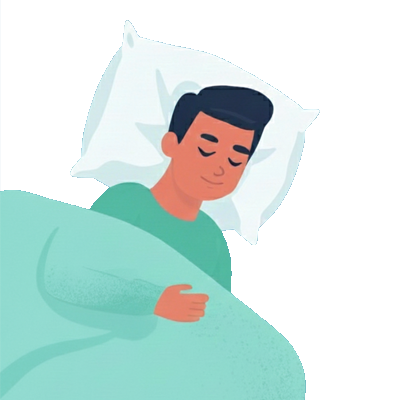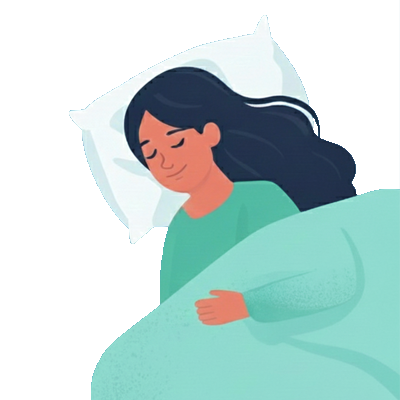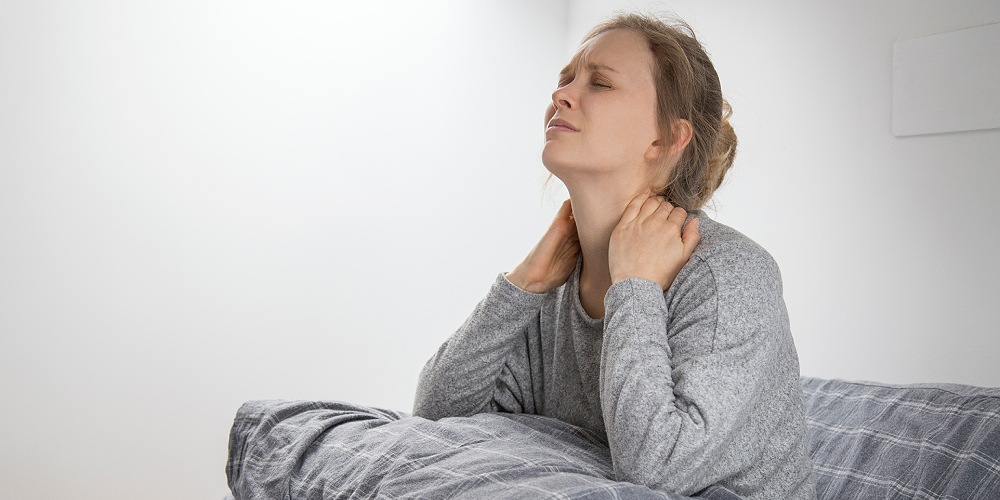Sleep and pain have a deeply intertwined relationship. People who experience chronic pain often report poor sleep, and those with sleep disorders like sleep apnea tend to have increased pain sensitivity. One of the most overlooked connections is between sleep apnea and back pain.
Let’s explore how sleep apnea and back pain are connected, whether can chronic pain cause sleep apnea, and even how conditions like sleep apnea and neck pain fit into the bigger picture.
Key Takeaways:
- Sleep apnea and back pain are closely linked, as poor sleep quality can worsen spinal discomfort and delay healing.
- Chronic pain and sleep apnea create a vicious cycle, where each condition intensifies the other.
- Neck pain may also be involved, with disrupted breathing and poor sleep posture contributing to sleep apnea and neck pain.
- CPAP-free products, such as oral appliances, offer a comfortable and travel-friendly alternative to traditional CPAP therapy.
- Addressing weight, posture, and inflammation can help relieve symptoms of both sleep apnea and back pain.
What is Sleep Apnea and Chronic Pain?
Sleep apnea is a condition where you experience repeated interruptions in breathing during sleep. These interruptions can lead to fragmented, low-quality rest, which can lead to multiple health problems. One of the lesser-discussed consequences is chronic pain.
Disrupted sleep affects multiple mechanisms ongoing in your body. It may affect the body’s ability to heal, regenerate tissue, regulate inflammation, and more. Over time, this can lead to increased sensitivity to pain and the development of chronic conditions like fibromyalgia, arthritis, and back pain. Studies show that people with obstructive sleep apnea are more likely to experience pain and are also more resistant to pain medication, just like how sleep apnea increases the risk of heart attack and stroke.
But what does this have to do with blood sugar, insulin, or CGM for weight loss?
The Hidden Link: Metabolic Dysfunction, Sleep, and Pain
Chronic pain and sleep apnea often coexist with metabolic dysfunction. When you’re not sleeping well, your hormones, especially insulin and cortisol, can become unbalanced. These hormonal shifts can lead to blood sugar spikes and weight gain, increased inflammation, and insulin resistance. Therefore, sleep apnea, if left untreated, can have serious health effects.
Insulin resistance and fat storage are tightly connected. When your cells stop responding to insulin effectively, your body stores more fat, especially around the abdomen. This added weight can worsen sleep apnea by increasing pressure on the airway. In a vicious cycle, poor sleep makes it harder to lose weight, and excess weight makes it harder to sleep.
This is where CGM for weight loss steps in as a revolutionary tool. By understanding how food, stress, and sleep affect your blood sugar in real-time, you can take control of your metabolism, and that means addressing both weight and chronic pain.
Risks Associated with Ignoring Sleep Apnea and Chronic Pain
Ignoring the link between sleep apnea and back pain can have detrimental effects on one’s physical and emotional health. We will talk about the possible concerns in this section:
Increasing Pain Symptoms: If left untreated, sleep apnea can increase the frequency and intensity of chronic pain symptoms, making pain management more difficult.
Decreased Quality of Life: For those who suffer from both illnesses, the combination of insufficient sleep and elevated pain can result in physical restrictions, a lower mood, and a lower quality of life.
Increased Healthcare Utilization: People with untreated sleep apnea and back pain frequently seek out additional medical care to manage their symptoms, which raises healthcare expenses and may result in abuse of painkillers.
Looking for a Comfortable Way to Manage Sleep Apnea?
Discover custom oral appliances designed to treat sleep apnea comfortably and effectively.




How Sleep Apnea Contributes to Back Pain
There are several ways sleep apnea and back pain are linked:
Poor Sleep Posture: Struggling to breathe at night can cause people to sleep in awkward positions, straining their back and neck.
Inflammation and Muscle Tension: Low oxygen levels from sleep apnea can trigger inflammation, which tightens muscles and aggravates spinal discomfort.
Weight Gain and Spinal Pressure: Sleep apnea often leads to weight gain, which increases stress on the spine and worsens back pain.
Reduced Healing: Sleep is when muscles and tissues repair. Without quality sleep, back injuries or muscle strain heal more slowly.
For some people, neck pain becomes relevant when the same issues affect the cervical spine, leading to sleep apnea and neck pain alongside back discomfort.
Addressing Both Sleep Apnea and Back Pain
Improving both conditions often requires a multi-pronged approach:
Medical Treatment for Sleep Apnea: Options include CPAP machines, oral appliances, or CPAP-free solutions offered by specialized clinics. This help keep airways open and improve oxygen flow at night.
Targeted Pain Management: Physical therapy, stretching routines, and proper mattress support can alleviate back strain.
Weight Management: Maintaining a healthy weight reduces pressure on the airway and spine, improving both sleep apnea and back pain.
Posture Awareness: Daytime and nighttime posture adjustments can reduce both lower back strain and sleep apnea, and neck pain.
Integrating CGM Into Your Pain Management Plan
If you’re managing chronic pain and dealing with sleep apnea, you may have tried everything, from CPAP machines and painkillers to physical therapy and meditation. But adding CGM for weight loss to your toolkit can provide a missing puzzle piece.
Here are a few steps to get started:
- Talk to a healthcare provider about trying a CGM device, especially if you suspect insulin resistance.
- Track your glucose patterns for 10–14 days to identify triggers like late meals, processed foods, or poor sleep.
- Experiment with your diet and exercise. Focus on low-glycemic meals and post-meal movement.
- Monitor the impact on pain and sleep. You may notice less morning stiffness, improved mood, and more energy.
CPAP Free Products
For many people struggling with sleep apnea and back pain, the idea of wearing a CPAP machine every night can feel overwhelming. Fortunately, CPAP-free solutions, such as oral appliances, offer a comfortable and effective alternative. These custom-fitted devices, worn in the mouth during sleep, gently reposition the lower jaw and tongue to keep the airway open, reducing breathing interruptions.
Oral appliances are small, portable, and easy to maintain—making them especially appealing for those who travel frequently or find CPAP masks uncomfortable. When paired with lifestyle changes and proper sleep posture, they can significantly improve airflow, enhance sleep quality, and even help alleviate related issues such as sleep apnea and neck pain.
Final Thoughts
To sum up, there is a complex relationship between sleep and chronic pain; however, one thing is common: metabolic health. CGM for weight loss offers a new and empowering way to understand your body and make targeted changes that last.
So, if you’re feeling stuck in a loop of poor sleep and persistent pain, consider giving continuous glucose monitoring for weight loss a try. Additionally, one more thing is worth trying: contacting a reliable sleep center that provides CPAP-free sleep solutions that help restore your peaceful nights. In this light, Midwest Sleep REMedies is the best option you can rely on. Having a team of expert professionals and state-of-the-art technology, we move forward with the main aim of providing CPAP-free sleep solutions and restoring your nights.
Have Questions About Disturbed Sleep?
Don’t wait for the symptoms to get worse. Talk to your doctor, get tested, and take the steps toward better sleep and a healthier life.










